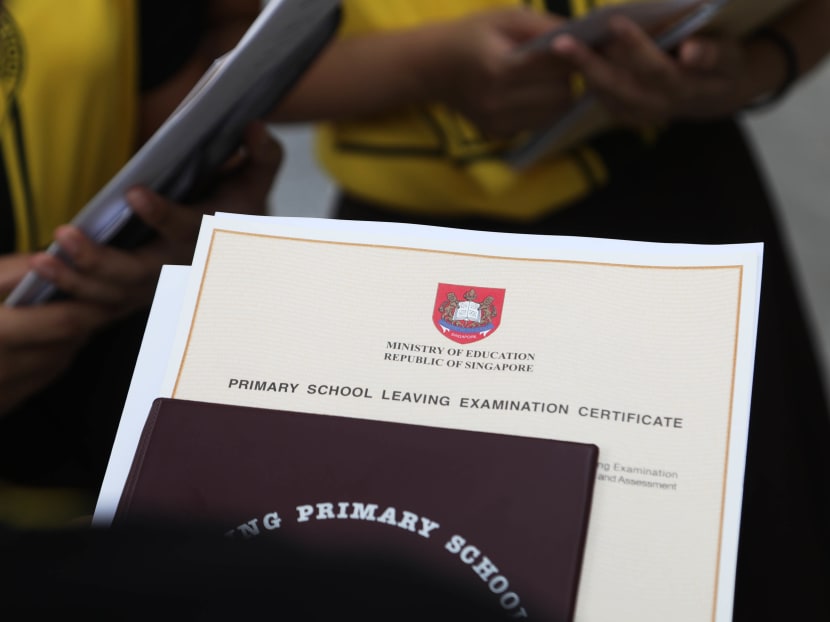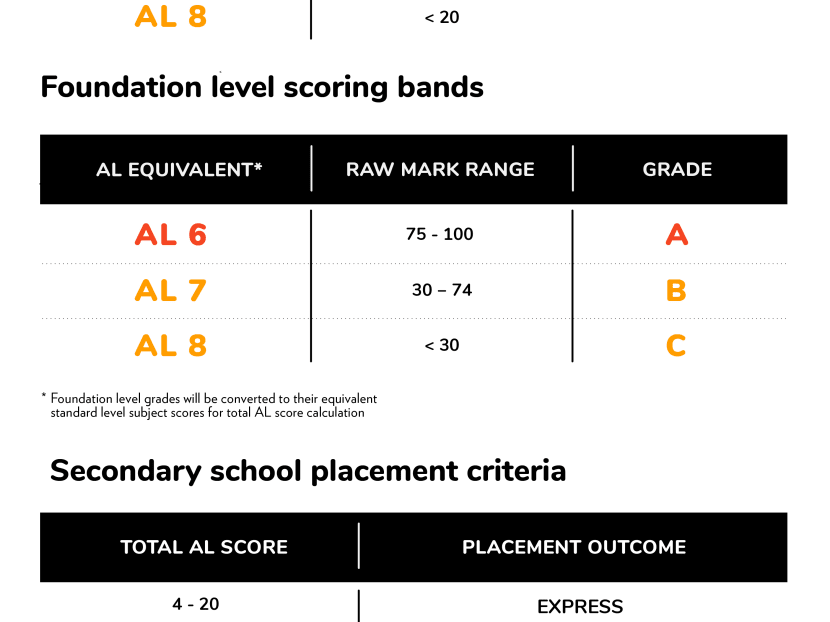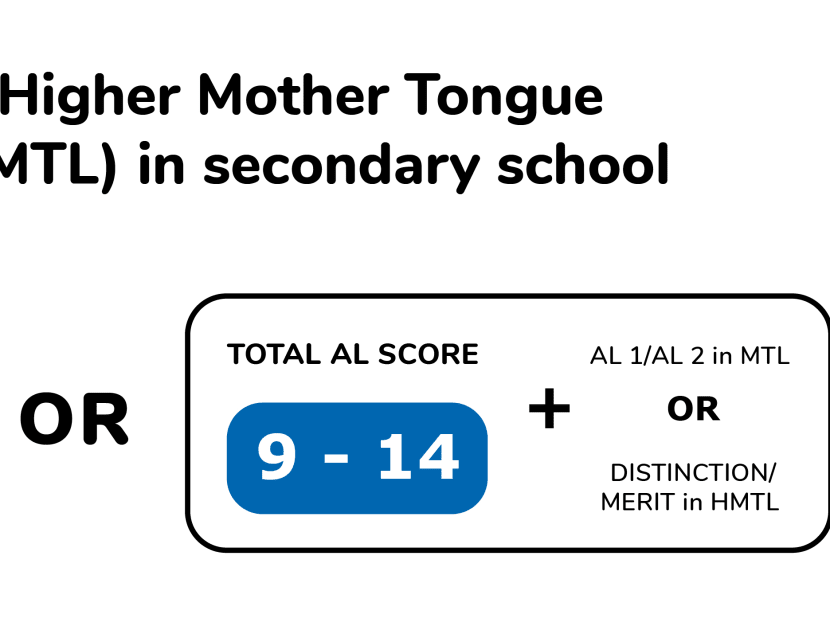MOE unveils measures to smoothen rollout of new PSLE scoring system
SINGAPORE — The Ministry of Education (MOE) on Thursday (July 25) announced measures that will help smooth the way for the major revamp of the Primary School Leaving Examination (PSLE) scoring system that takes effect in 2021.

The Ministry of Education has announced measures that will help smooth the way for the major revamp of the Primary School Leaving Examination (PSLE) scoring system that takes effect in 2021.
SINGAPORE — The Ministry of Education (MOE) on Thursday (July 25) announced measures that will help smooth the way for the major revamp of the Primary School Leaving Examination (PSLE) scoring system that takes effect in 2021.
Beginning with next year’s Primary 5 cohort, students will receive school-based examination report cards with their grades indicated as Achievement Level (AL) scores from AL1, the best, to AL8, instead of the current alphabetical grades. The AL scoring system will not apply to students in Primary 1 to 4.
This measure will help familiarise students and their parents with the new system, since these Primary 5 students next year will be the first batch to face the revamped PSLE system in 2021 when they are in Primary 6 — a change that was announced in 2016.
It will also help with subject choices for those students at the end of Primary 4 this year.
The Primary 6 cohort next year will not have AL scores reflected in their examination report cards. From 2021 onwards, all Primary 5 and Primary 6 students will receive AL scores.
A key feature of the new scoring system is that students will be graded based on their individual performance in the subjects, regardless of how their peers have done.
The changes to the PSLE “support MOE’s effort to shift away from an over-emphasis on academic results, and provide our students with more flexibility and space to develop their strengths and interests throughout their education”, the ministry said on Thursday.
On Thursday, MOE also unveiled the AL scoring system that will be used for Foundation-level subjects, which cater to students needing additional help, and the eligibility criteria for those who wish to take Higher Mother Tongue in secondary school.
The ministry added that it would publish the cut-off points for secondary schools based on the AL scores in the first half of 2021.
Here is what you need to know:
Q: How are PSLE scores going to change?
The MOE first announced changes to the PSLE “T-score” system three years ago, in one of the biggest revamps to the national examinations for primary school students in many years.
Back then, the MOE said that the T-score — short for transformed score — would be replaced by eight AL scores.
A T-score reflects how well a student did in relation to others in the cohort — using a mathematical formula. A student may have scored high marks for a subject, but would receive a lower T-score if most of his peers performed better than him.
In the AL scoring system, a student’s score is not linked to his peers’ performance.
AL1 will mean scoring 90 marks or more in a subject, AL2 for 85 to 89 marks, and so on.
The AL scores for the four PSLE subjects (English Language, Mathematics, Science and Mother Tongue) at the Standard level will be totalled to give students a PSLE score of between AL4 and AL32, with AL4 being the best.
Q: The new system groups students with 75 marks and above into 4 AL bands (AL 1 to 4) instead of the current 2 bands (A* and A). Doesn’t this contradict the stated aim of reducing fine differentiation between students?
The MOE said that the upper ranges for the AL scores are narrower to better differentiate the students’ level of understanding. For the middle to lower ALs, wider raw mark ranges are sufficient to give a good indication of a student’s progress, and further differentiation is less educationally meaningful, it added.
Q: How will Foundation-level subjects — which are less difficult than Standard-level subjects — be graded in AL terms?
Under the current PSLE grading system, Foundation subjects are graded into five bands: Grades 1, 2, 3, 4 and U. Those who score 85 and above are in Grade 1, and so on.
Under the new AL system, the MOE announced on Thursday that Foundation subject grades will be placed into three broader bands — AL A, AL B and AL C. At the PSLE level, AL A is equivalent to AL6, AL B to AL7, and AL C to AL8.

Q: How did MOE peg AL scores for Foundation subjects to Standard subjects?
MOE said that the scoring bands for Foundation subject grades reflect their curriculum and assessment load relative to Standard subjects.
Q: How will secondary school streaming be affected under the AL score system?
Students who score between 4 and 20 will be eligible for the Express stream, while those scoring 21 to 22 could have the option of opting for Express or Normal Academic streams depending on the school they choose. Those with 23 points and above will be streamed into Normal Academic or Normal Technical routes.
Under this system, a student taking a combination of Foundation and Standard subjects may still qualify for Express stream.
The MOE said on Thursday that it would publish the cut-off points for secondary schools in AL terms only in the first half of 2021 as the indicative points for the 2021 cohort can be derived only through simulations based on the scores and choice patterns from the 2020 Secondary 1 posting exericse.
Q: What happens after 2024, when secondary school streaming is abolished?
Come 2024, pupils will be posted to secondary schools where subjects are offered at three levels: G1, G2 and G3.
The MOE said students who score between AL26 and AL30 in their PSLE will be offered the G1 suite of subjects, and those who score between AL4 and AL20 will be offered the highest G3 suite.
Those who score AL25 can choose either G1 or G2 subjects, and those who score AL21 or AL22 can choose between G2 and G3.
G1 would generally correspond to the Normal (Technical) level and G3 to the Express stream.
Q: Are these changes enough to reduce the emphasis on academic performance?
In 2016, when the changes were unveiled, some questioned if the steps were enough.
Then Acting Education Minister Ng Chee Meng said that in a “good” education system like Singapore, he thought it was “premature to revolutionise it” until more steps were taken to foster a more innovative and creative learning environment.
As to whether the new scoring system would be enough to ease the pressure of the PSLE, Mr Ng said it would take parents, educators and society in general “to move this school system forward so that we reduce the competitiveness of it, and encourage creativity and collaboration of succeeding together”.
OTHER ANNOUNCEMENTS ON THURSDAY
Q: How will Higher Mother Tongue be graded according to the new AL scoring system?
Currently, students who take Higher Mother Tongue at PSLE level are graded with distinction, merit or pass. For students in the top 30 per cent of the cohort who take Higher Chinese, these grades translate into additional points for admission into SAP schools. They receive three points for a distinction, two for a merit and one for a pass.
MOE announced on Thursday that under the new PSLE system, students will be given either a ‘D’ for Distinction or ‘M’ for merit. The relevant letter will appear beside a student’s PSLE AL score. (For example: AL8D)

Q: Who is eligible to take Higher Mother Tongue in secondary school?
-
Students with an overall PSLE score of AL8 and better
-
Students with an overall PSLE score of 9 to 14, who also attain D or M (distinction or merit) in Higher Mother Tongue
-
Students with an overall PSLE score of 9 to 14, and attain AL1 or AL2 in the Mother Tongue subject
For students who do not meet the above criteria, secondary schools will continue to have the flexibility to offer Higher Mother Tongue to students if they are assessed to have high ability and interest in the Mother Tongue subject, and are able to take Higher Mother Tongue without affecting their performance in other subjects.











